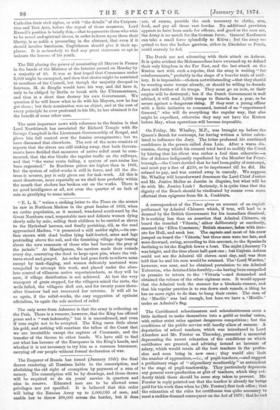" E. L. K. " writes a striking letter to
the Times on the scenes he saw in Northern Madras in the great famine of 1833, when an entire population, as it seemed, wandered southward by the Great Northern road, respectable men and delicate women dying slowly mile by mile, selling their children to be carried as slaves to the Hydrabad harems, and finally perishing, till, as the road approached Madras, "it presented a still sadder sight, its sur- face strewn with dead bodies lying half-buried, arms and legs protruding above the soil, and the famishing village dogs tossing about the torn remnants of those who had become the prey of the jackals." At Masulipatam, the carriers made their rounds every day, conveying the dead to large open pits, where the vul- tures stood and gorged. An order had gone forth to relieve none except by tank-digging, and women delicately nurtured were compelled to attempt this work, and placed under the abso- lute control of villanous native superintendents, as they will be now, if village distribution is not achieved. At last the very transport of grain stopped, for the villagers seized the carts, the wells failed, the villagers died out, and for twenty years there- after Guntoor had not recovered her revenue. It will all be so again, if the relief-works, the easy suggestion of optimist officialism, be again the sole method of relief.


































 Previous page
Previous page